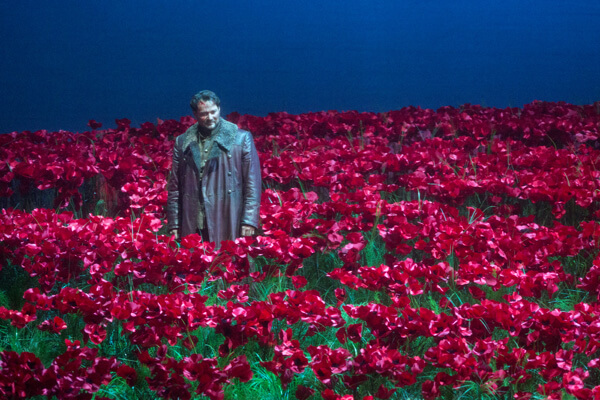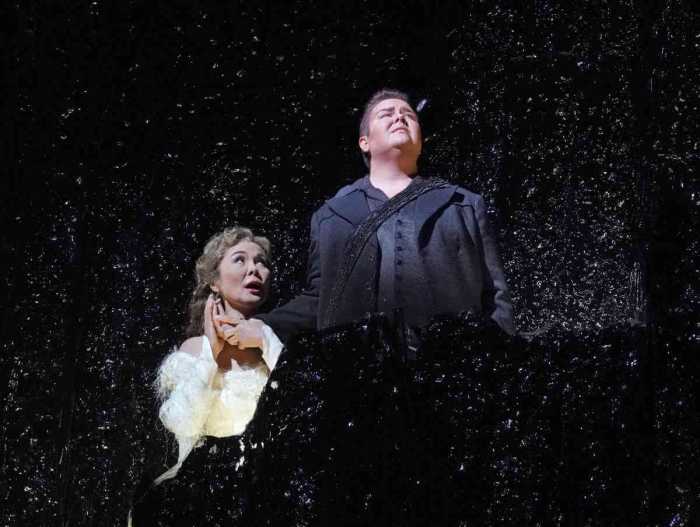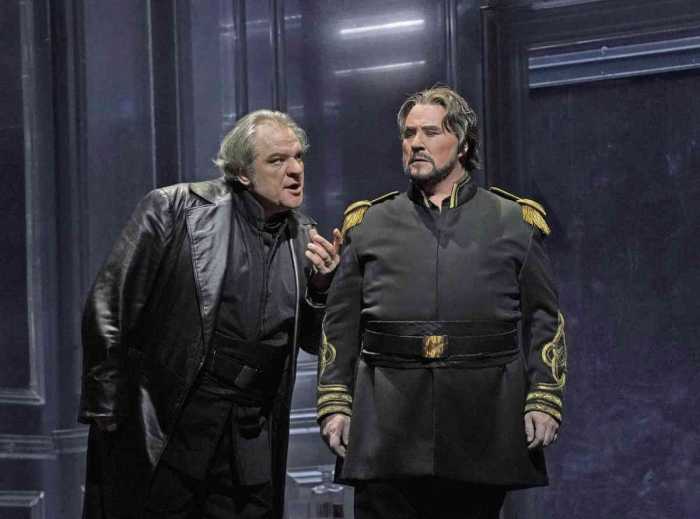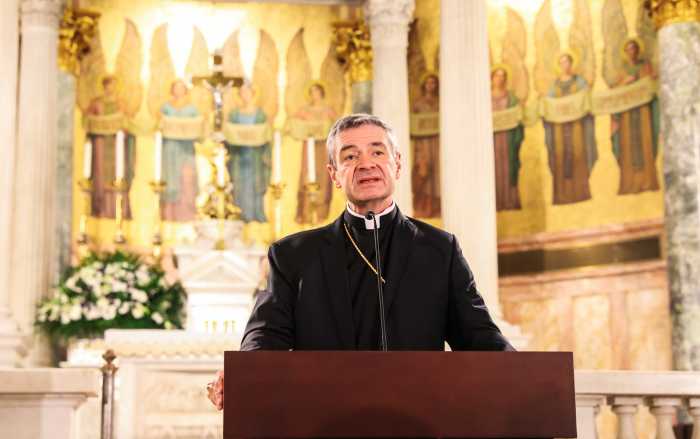BY DAVID SHENGOLD | The first time I went to hear Handel’s oratorio “Theodora,” I assumed I would be seeing lurid tales of the Byzantine streetwalker turned empress. Hardly. This extremely sober, extremely beautiful work concentrates on — thank you, Amanda Wingfield! — Christian martyrs in ancient Antioch.
The February 2 Carnegie audience seemed to appreciate the high quality of both the score and the performance they were hearing. This “Theodora” represented the second in Harry Bicket’s three-season series of touring Handel stage works. With City Opera gone and the Met condescending to the baroque repertoire — which has a huge American public that will travel for quality offerings — with the badly scripted pastiche “Enchanted Island,” Carnegie having a first-rate Handelian conductor like Bicket bring through these well-cast touring attractions is wise and salutary.
Fine encounters with Handel and Borodin
Carnegie has also latched on to the excellent German soprano Dorothea Röschmann, whose lovely voice of a somewhat reduced range is perfectly suited to most Handel heroines. She was memorably expressive and dulcet as the upstanding Theodora, punished for her resistance by an imperious pagan overlord. Didymus, the secret Roman convert to Christianity who loves Theodora, made David Daniels into a star in Britain at the Glyndebourne Festival’s 1996 production. He still performs it movingly and tellingly, even if in the first part he took some time to warm up. The legato sections were exquisite, particularly the ravishing duet with Röschmann’s heroine that ended Act Two. These two star singers make a wonderful team.
Anyone who has seen that Glyndebourne show on YouTube has Lorraine Hunt’s towering performance as Theodora’s co-religionist Irene etched on their brain. Sarah Connolly, while a proficient singer alert to the needed stylistic approach, did not obliterate those memories. She is a fine, conscientious artist but rather a cold one — the timbre is exciting but lacks repose, and there’s a touch of truculence about her demeanor.
Kurt Streit, as the sympathetic Roman officer Septimius, made every single word clear, and though his career has moved beyond the purely lyric roles he took on two decades ago, it still moves with astonishing ease and could sustain soft passages without any problems. Neal Davies, an excellent Handelian stylist, sounded a bit bottled up at first as the hissable baddie Valens, but (like Daniels) improved markedly as he went along, certainly articulating the yards of coloratura well.
Pretty much a top-drawer cast, but the afternoon’s real miracles came from Bicket’s superb English Concert, just on fire, and Julian Wachner’s Choir of Trinity Wall Street, who rose to the exalted level of their colleagues — and the music. Bicket’s next Carnegie Handel will be the wondrous “Alcina” on October 26 with Joyce diDonato and Alice Coote — calendars out!
The Met’s bracing new “Prince Igor” (seen February 6) represented a successful gamble by Peter Gelb — the first American work commissioned from controversial director Dmitri Tcherniakov. Working with Gianandrea Noseda (who conducted honorably if tamely), Tcherniakov fashioned a re-ordered edition of the (disparate) score materials, privileging material actually written by Borodin and not his posthumous “collaborators” Rimsky-Korsakov and Glazunov.
Tcherniakov concentrated on a psychological study of the title hero and not the conventional “clash of cultures” underpinned by orientalist trappings. The great hall of Igor’s city-state Putivl’ took the form of a very spacious, white-walled structure with a gallery, the architecture as well as Elena Zaitseva’s fine costumes evoking several Russian epochs. The steppe, the realm of the nomadic Polovtsy — whom Igor has foolishly engaged in battle — was a seemingly limitless blue-skied field of red poppies; the entire musical hit parade that is the Polovtsian Act clearly arose in the dreams of an Igor wounded on the battlefield. The first act’s black-and-white video projections proved striking: Ildar Abdrazakov’s face as Igor — studied iconically in the manner that Sergei Eisenstein presented Nikolai Cherkassov’s — and random soldiers. In this realistic black-and-white “war” world, his son Vladimir (Sergey Semishkur, decent if lacking legato) was killed and we saw Igor shutting his eyes and weeping disconsolately.
The production had two serious weaknesses. Simply put, Itzik Galili’s choreography for the Polovtsian Dances was terrible — like jazzercise routines at a Club Med, free not only of ethnicity but also of any of the music’s sensuality. Also, virtually all of the “steppe” music took place in Act One. After those beautiful poppies and remarkably effective video projections, it became visually dull for Act Two to be an almost entirely traditional replaying of domestic events — three separate scenes in which Prince Vladimir Galitsky’s misdeeds impinge on the female modesty his sister Jaroslavna embodies.
Psychological complexity returned only in Act Three, set in a ruined, post-apocalyptic Putivl’ Great Hall. War-caused detritus (fires in barrels, torn out walls and ceiling beams, a leaking water pipe) evokes both cinematic roots in Andrei Tarkovsky’s “Stalker” and previous Tcherniakov work, like his Mariinsky “Kitezh.” Igor’s internal drama here — visually evoking “Parsifal” — became that of redemption through rebuilding. Consistently underpowered vocally like Stefan Kocán’s mediocre Kontchak, Ildar Abdrazakov at least phrased and acted Igor with considerable distinction. Mikhail Petrenko fared solidly as Galitski. Oksana Dyka, full-voiced yet shrill, made a more equivocal debut as Jaroslavna, whose lovely music needed more dynamic variety. Anita Rachvelishvili’s vocally raucous Konchakovna reprised her exuberantly brazen Carmen performances. “Igor” — a “don’t miss” show — runs through March 8.
On February 8, Christine Brandes joined the fine Brentano Quartet at the 92nd Street Y — how nice to hear classical singing there again! The accomplished (and out) soprano brought her dark lyric sound, which retains its freshness, to Haydn’s pleasant but unmemorable “Arianna a Naxos,” in which she partnered the string players with remarkable musicianship. The ensemble then introduced Eric Moe’s “Of Color Braided All Desire,” a quartet of accomplished love poem settings of lesbian author May Swenson (1913-89). Moe required much ostinato playing from the Brentano. His Barber-like prosody deftly handled Swenson’s many internal rhymes and required some pinpoint dynamics and wide leaps by Brandes. It was a fine performance, followed by the quartet alone in Mendelssohn’s irresistible Opus 44, No 1.
David Shengold (shengold@yahoo.com) writes about opera for many venues.



































